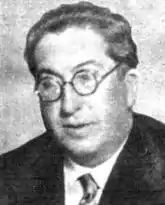Eduardo Ortega y Gasset
Eduardo Ortega y Gasset (1882–1965) was a Spanish politician, journalist and lawyer.
Eduardo Ortega y Gasset | |
|---|---|
 | |
| 69th Attorney General of the Republic | |
| In office December 1936 – November 1937 | |
| Civil Governor of Madrid | |
| In office April 1931 – June 1931 | |
| Personal details | |
| Born | 11 April 1882 Madrid, Spain |
| Died | 25 February 1965 Caracas, Venezuela |
| Nationality | Spanish |
| Occupation |
|
Biography
Born in Madrid on 11 April 1882.[1] He was the older brother of philosopher José Ortega y Gasset.[2]
He became a member of the Congress of Deputies after the 1910 general election, in representation of the electoral district of Coín (province of Málaga). He joined the Liberal fraction.[3] He renovated his seat at the 1914, 1916, 1918, 1919, 1920 and 1923 elections.[4]
He joined the Freemasonry in 1922.[1] During the dictatorship of Primo de Rivera, Ortega y Gasset self-exiled to Paris; he became there a close acquaintance of Miguel de Unamuno,[5] collaborating along the latter and Blasco Ibáñez in the España con Honra magazine.[6] He was one of the founders of the Radical Socialist Republican Party (PRRS) in 1929.[7]
He was among the signatories of the Pact of San Sebastián on 17 August 1930.[8]
On 15 April 1931, immediately after the proclamation of the Second Republic, he was appointed Civil Governor of the Province of Madrid.[9] In June 1931, he was replaced as civil governor by Emilio Palomo Aguado.[9] He ran as candidate for the 1931 Constituent election in the constituencies of Ciudad Real, Guadalajara and Granada; elected in the three constituencies, he chose to remain as legislator representing the first constituency.
He was expelled from the PRRS in 1932 along Juan Botella Asensi, chiefly on the basis of having repeatedly broke party discipline.[10][4] They formed then the Izquierda Radical Socialista ("Radical Socialist Left").[4] By that time he was Master of the Logia Luis Simarro No. 3 in Madrid.[1]
A target of right-wing terrorist groups, he suffered an attempt on his life on 7 April 1936, when a bomb hidden in a basket of eggs exploded in his residence at the calle de Rafael Calvo 12.[11][12]
He was appointed Attorney General of the Republic in December 1936.[13]
Exiled to Venezuela after the end of the Spanish Civil War,[14] he died on 25 February 1965 in Caracas.[15]
Works
- — (1935). Etiopía. El conflicto italo-abisinio.[16]
References
- Citations
- Esteban Barahona 1999, pp. 19–20.
- Lasaga 2014, pp. 17–18.
- "Ortega y Gasset, Eduardo. 46. Elecciones 8.5.1910". congreso.es. Congress of Deputies.
- Cucalón Vela 2016.
- Urrutia León 2009, pp. 194–195.
- Urrutia León 2009, p. 195.
- Tuñón de Lara 1967, p. 129.
- Núñez Rivero 2017, p. 251.
- Serralonga i Urquidi 2007.
- Avilés Farré 2006, p. 211.
- "Estalla una bomba en un piso de la calle de Rafael Calvo, causando daños materiales". ABC. Madrid: 47. 8 April 1936.
- Sánchez Pérez 2015, p. 108.
- "Eduardo Ortega y Gasset, fiscal general de la República". ABC. Madrid: 7. 11 December 1936.
- Pradera, Javier (19 February 2002). "Las dianas del arquero". El País.
- "Esquela". ABC. Madrid: 107. 24 February 1966.
- González Aimé 2011, pp. 215–217.
- Bibliography
- Avilés Farré, Juan (2006). La izquierda burguesa y la tragedia de la II República Juan Avilés Farré (PDF). Madrid: Consejería de Educación de la Comunidad de Madrid. ISBN 84-451-2881-7.CS1 maint: ref=harv (link)
- Cucalón Vela, Diego (2016). "Ejercer el poder con herencias del pasado: el Partido republicano Radical Socialista ante la Segunda República española". Cahiers de civilisation espagnole contemporaine (in Spanish) (17). doi:10.4000/ccec.6331. ISSN 1957-7761.CS1 maint: ref=harv (link)
- Esteban Barahona, Luis Enrique (1999). "Masones en Guadalajara: una primera aproximación" (PDF). Añil (17): 13–20. ISSN 1133-2263.
- González Aimé, Elsa (2011). "Ortega y Gasset, Eduardo, Etiopía. El conflicto italo-abisinio, Ediciones del Viento, Madrid, 2009 [1ª edición 1935]" (PDF). Relaciones Internacionales. Madrid: Universidad Autónoma de Madrid (16).CS1 maint: ref=harv (link)
- Lasaga, José (2014). "Ortega y Gasset y la Guerra Civil española" (PDF). Cuadernos Hispanoamericanos. Madrid: Agencia Española de Cooperación Internacional para el Desarrollo (774). ISSN 0011-250X.CS1 maint: ref=harv (link)
- Núñez Rivero, José María Cayetano (2017). "La masonería y la Segunda República española (1931–1939)" (PDF). Estudios de Deusto. Universidad de Deusto. 65 (1): 243–270. doi:10.18543/ed-65(1)-2017pp243-270. ISSN 0423-4847.CS1 maint: ref=harv (link)
- Sánchez Pérez, Francisco (2015). "El 'Héroe' frente a la maligna república". Hispania Nova. Getafe: Universidad Carlos III de Madrid. ISSN 1138-7319.CS1 maint: ref=harv (link)
- Serralonga i Urquidi, Joan (2007). "El aparato provincial durante la Segunda República. Los gobernadores civiles, 1931–1939" (PDF). Hispania Nova. Getafe: Universidad Carlos III de Madrid (7). ISSN 1138-7319.CS1 maint: ref=harv (link)
- Tuñón de Lara, Manuel (1967). Historia y realidad del poder (el poder y las élites en el primer tercio de la España del siglo XX). Madrid: Edicusa.CS1 maint: ref=harv (link)
- Urrutia León, Manuel María (2009). "Miguel de Unamuno y "España con honra" (1924–1925)". Cuadernos de la Cátedra Miguel de Unamuno (in Spanish). Salamanca: Universidad de Salamanca. 47 (1): 193–234–234. ISSN 0210-749X.CS1 maint: ref=harv (link)